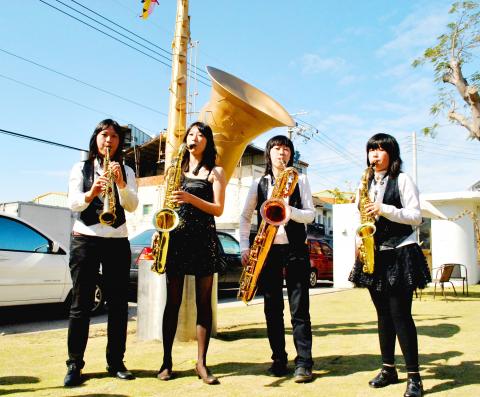A saxophone museum documenting the life of Taiwan’s first saxophone maker and the development of saxophone making in Houli District (后里), Greater Taichung, opened to the public yesterday.
The Chang Lien-cheng (張連昌) Saxophone Museum is named after a local resident who made the first saxophone in Taiwan on his own, sparking the development of the saxophone production industry in Houli, which is now one of the largest centers of saxophone production in the world.
TOURIST-FRIENDLY

Photo: CNA
Located in a town nicknamed “Musical Instrument Town,” the museum will display a collection of saxophones. Previously a memorial hall dedicated to Chang, the museum site now has a new two-story building, a concert hall and a tourist-friendly factory that allows visitors to see how the instrument is made.
“The museum is certainly not the only saxophone museum in Taiwan, but it is definitely the only one with a lot of stories to be shared,” Wang Tsai-jui (王彩蕊), Chang’s granddaughter-in-law, said in a telephone interview on Wednesday.
Chang, born in 1912, was a farmer’s son who abandoned the family’s farm to become a painter. He later joined a band when he was in his 20s.
“No one during the 1930s was actually playing any kind of Western instruments, but Chang was fascinated by the saxophone,” Wang said.
DETERMINED
When Chang’s saxophone was damaged in a fire, he was determined to build the brass tube by himself. He started from observing the shape of the instrument on canvas.
Three years into the making of the saxophone in 1948, he lost the sight in his right eye when a piece of copper flashed into his eyeball. However, the incident did not stop Chang from continuing his pursuit and the first locally made saxophone was finished shortly after the accident.
“The museum is really about showing the personality and perseverance of a person who loved music so much,” Wang said.
Chang trained a number of apprentices, helping saxophone making become a lucrative export industry for Taiwan from the 1950s to the 1990s. It’s no longer as profitable as it once was because of competition from China.
Two of the must-see saxophones in the museum are an intricately made instrument with a dragon decoration on the tube, specially made by Chang, and a 160-year-old saxophone produced by saxophone inventor Adolphe Sax, which was found and bought by Wang’s family through laborious trips to Belgium, Wang said.
FASCINATING
“We knew from the start that the museum is about more than showcasing the locally made instruments; we want to tell the very first story of this fascinating instrument,” Wang said.
Wang’s four daughters are all saxophone players.

The High Prosecutors’ Office yesterday withdrew an appeal against the acquittal of a former bank manager 22 years after his death, marking Taiwan’s first instance of prosecutors rendering posthumous justice to a wrongfully convicted defendant. Chu Ching-en (諸慶恩) — formerly a manager at the Taipei branch of BNP Paribas — was in 1999 accused by Weng Mao-chung (翁茂鍾), then-president of Chia Her Industrial Co, of forging a request for a fixed deposit of US$10 million by I-Hwa Industrial Co, a subsidiary of Chia Her, which was used as collateral. Chu was ruled not guilty in the first trial, but was found guilty

‘DENIAL DEFENSE’: The US would increase its military presence with uncrewed ships, and submarines, while boosting defense in the Indo-Pacific, a Pete Hegseth memo said The US is reorienting its military strategy to focus primarily on deterring a potential Chinese invasion of Taiwan, a memo signed by US Secretary of Defense Pete Hegseth showed. The memo also called on Taiwan to increase its defense spending. The document, known as the “Interim National Defense Strategic Guidance,” was distributed this month and detailed the national defense plans of US President Donald Trump’s administration, an article in the Washington Post said on Saturday. It outlines how the US can prepare for a potential war with China and defend itself from threats in the “near abroad,” including Greenland and the Panama

DEADLOCK: As the commission is unable to forum a quorum to review license renewal applications, the channel operators are not at fault and can air past their license date The National Communications Commission (NCC) yesterday said that the Public Television Service (PTS) and 36 other television and radio broadcasters could continue airing, despite the commission’s inability to meet a quorum to review their license renewal applications. The licenses of PTS and the other channels are set to expire between this month and June. The National Communications Commission Organization Act (國家通訊傳播委員會組織法) stipulates that the commission must meet the mandated quorum of four to hold a valid meeting. The seven-member commission currently has only three commissioners. “We have informed the channel operators of the progress we have made in reviewing their license renewal applications, and

A wild live dugong was found in Taiwan for the first time in 88 years, after it was accidentally caught by a fisher’s net on Tuesday in Yilan County’s Fenniaolin (粉鳥林). This is the first sighting of the species in Taiwan since 1937, having already been considered “extinct” in the country and considered as “vulnerable” by the International Union for Conservation of Nature. A fisher surnamed Chen (陳) went to Fenniaolin to collect the fish in his netting, but instead caught a 3m long, 500kg dugong. The fisher released the animal back into the wild, not realizing it was an endangered species at